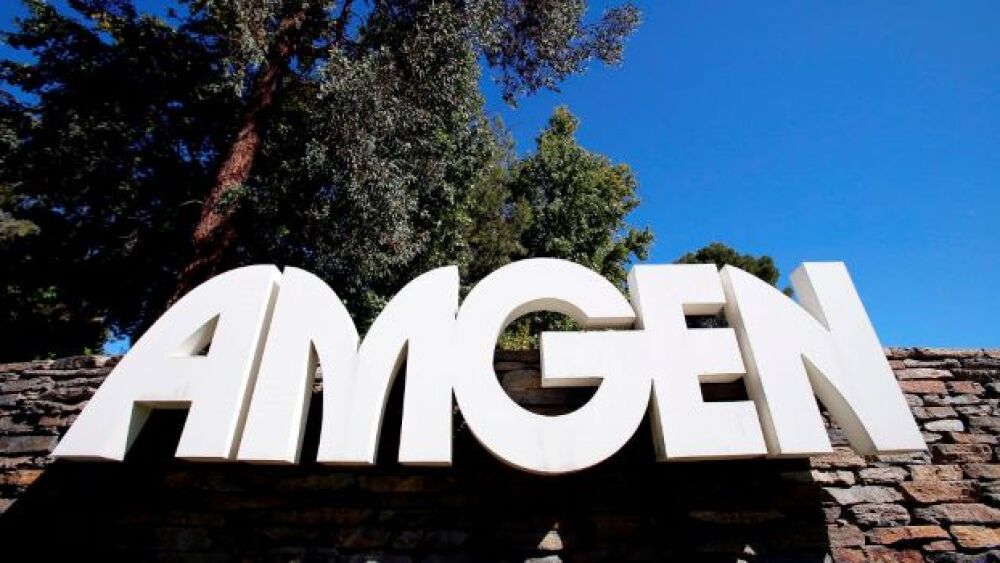Amgen anticipates Lumakras (Amgen lung cancer drug) to become a cornerstone medicine as the company aims to develop multiple medications for the targets.
Amgen lung cancer drug. Al Seib / Los Angeles Times via Getty Images
Amgen Chairman and Chief Executive Officer Robert Bradway anticipates its non-small-cell Amgen lung cancer drug Lumakras will become a cornerstone medicine as the company aims to develop multiple medications for targets long thought to be undruggable.
The U.S. Food and Drug Administration approved Lumakras (sotorasib) in June under accelerated approval as a treatment for adult patients with KRAS G12C-mutated locally advanced or metastatic non-small cell lung cancer (NSCLC), who have received at least one prior systemic therapy. When it was approved, David Reese, Amgen’s executive vice president of Research and Development, called the approval of Amgen lung cancer drug a “breakthrough moment” for patients with this specific kind of lung cancer. He also acknowledged that patients would benefit from a targeted therapy for a mutation that has been elusive to researchers for decades.
“Our newest product, Lumakras, a first-in-class lung cancer treatment, is off to a strong start, and our robust pipeline of potential new medicines across all stages of development sets us up well to drive growth over the long term,” Bradway said in the company’s third quarter financial report. “We achieved solid growth in the quarter as our medicines reached an increasing number of patients around the world.”
Development Timeline of Amgen Lung Cancer Drug
Since it was approved, Lumakras (Amgen lung cancer drug) has already generated $45 million in cumulative sales. The oncology drug has already been prescribed by more than 500 physicians. Amgen noted that many clinical laboratories have updated their reports to reflect KRAS G12C as an actionable mutation and that their oncologists are now testing approximately 75% of patients with NSCLC at diagnosis for the KRAS G12C mutation.
In addition to NSCLC, Amgen is assessing Lumakras in multiple indications. A Phase III study of Lumakras combined with Amgen’s metastatic colorectal cancer drug Vectibix is expected to begin in the fourth quarter. The study will aim in treating advanced KRAS G12C-mutated colorectal cancer.
The company is also anticipating top-line results from the confirmatory Phase III study comparing Amgen lung cancer drug Lumakras to docetaxel in patients with KRAS G12C-mutated advanced NSCLC in the first half of 2022. Also, top-line results from the Phase II monotherapy study in patients with KRAS G12C-mutated solid tumors other than NSCLC and CRC are expected in the first half of 2022.
Amgen saw a yield increase of 4% to $6.7 billion for the quarter compared to the same quarter in 2020. Revenue was driven by sales of Prolia (denosumab), Evenity (romosozumab-aqqg), Repatha (evolocumab) and MVASI (bevacizumab-awwb).
In its report, Amgen noted that sales of osteoporosis drug Prolia increased by 15% year-over-year for the third quarter. New and repeat patient visits continued to improve as osteoporosis diagnosis rates in the U.S. reached over 90% of pre-COVID levels during the quarter.
Evenity, which was approved for osteoporosis in postmenopausal women, saw a significant boost in its sales. Sales increased 153% year-over-year to $149 million for the third quarter.
Sales of cholesterol drug Repatha increased 33% year-over-year for the third quarter. The company noted that the boost in sales was due, in part, to an increase in the number of U.S. Medicare Part D patients who are now receiving Repatha.
Other than Amgen lung cancer drug, in September, the FDA approved Repatha as an adjunct to diet and other low-density lipoprotein cholesterol (LDL-C)-lowering therapies for the treatment of pediatric patients 10 years and older who have been diagnosed with heterozygous familial hypercholesterolemia (HeFH). The FDA also expanded the homozygous familial hypercholesterolemia (HoFH) indication to patients aged 10 years and older.
One drug that saw a decline in sales for the quarter was the migraine drug Aimovig. Amgen sales decreased 25% year-over-year for the third quarter, driven by lower net selling price.
In its updated full-year guidance for 2021, Amgen anticipates generating revenue between $25.8 billion and $26.2 billion and Amgen lung cancer drug sales will be a major part of it.
Featured Jobs on BioSpace





